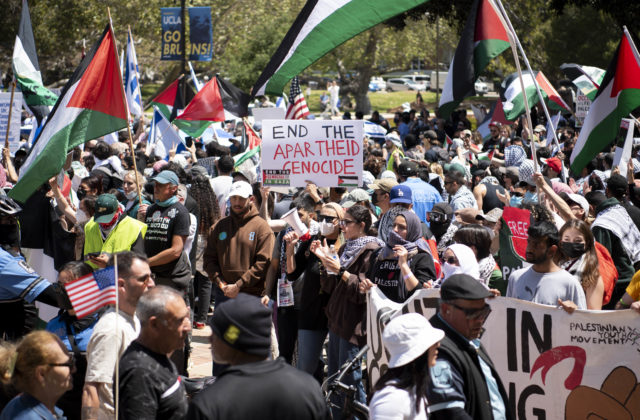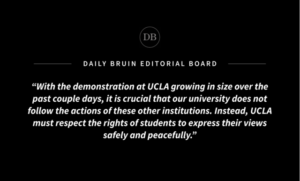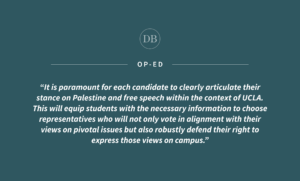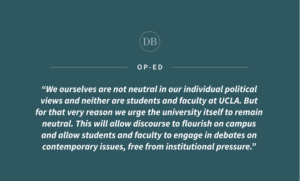This post was updated Oct. 10 at 8:24 p.m.
After a spring quarter with a deep level of civil unrest, division and traumatic events, many incoming and returning UCLA students feel anxious about traveling back to campus.
Ahead lies an uncertain future for our freedom of expression, while the encampment attacks and police sweep are still vivid in our memories.
With a series of updates on the UC’s decision to prohibit encampments and UCLA’s overhaul of Time, Place and Manner policies, I now fear the campus will become completely unrecognizable.
More importantly, I am very concerned that UCLA and UC administrators are dedicating themselves to promoting a false narrative – one that presents them as champions of campus safety and free speech, while in actuality masking their real efforts in abusing power and restricting expression.
UCLA’s narrative is perhaps best summarized in Interim Chancellor Darnell Hunt’s Sept. 5 announcement of a “Four Point Plan for a Safer, Stronger UCLA,” sharing a framework outlining UCLA’s operations that are to be implemented.
The first point consists of “enhancing community safety and well-being” by expanding the Office of Campus Safety that was established by former Chancellor Gene Block this May.
Stepping back to examine the Office of Campus Safety, its actions remain remarkably ambiguous.
“The office is responsible for coordinating and enhancing UCLA’s safety efforts across all areas, implementing approaches that take into account the varied perspectives and lived experiences of all those who make up our diverse community,” UCLA Media Relations said in an emailed statement.
There are many things we do not know, such as the full details of UCPD’s management or the money spent on safety operations. A website for this new office has still yet to go online.
This lack of transparency means that students cannot effectively scrutinize the office’s activities and how much money from our tuition and fees is being actively assigned to policing.
A deeper investigation into the events of the past quarter will reveal that UCLA leadership’s reason for promoting campus safety is to target student protesters.
“The violence that we experience on campus is due to police inaction and then to police action. I mean, thinking that the police are going to help with issues while it was, last year, the cause of the violence is mind-boggling,” said Raphaël Rouquier, a professor of mathematics and a member of the Legislative Assembly of the Academic Senate.
Indeed, only one arrest was made in association with the mob attack involving the use of fireworks and tear gas against pro-Palestine protests on the night of April 30. On the contrary, over 200 student protesters were arrested for unlawful assembly following the dismantling of the encampment by police May 2.
Behind the scenes, it is no secret that police involvement has become a significant issue in ensuring campus safety.
UCLA’s May 2022 Public Safety Report – the same report the Office of Campus Safety referenced to incorporate guidance on safety efforts – highlighted numerous concerns students have regarding the UCPD, including racial profiling, the militarization of campus police, instilling fear in LGBTQ+ individuals and a general reluctance to call the police for help because of a lack of trust.
This illustrates the true threat to campus safety: UCLA’s failure to protect students and UCPD’s brutalization of the Bruin community.
The third point in Interim Chancellor Hunt’s Four Point Plan is to “promote freedom of expression” under the new TPM policies.
“These policies are designed to allow community members to express themselves and use UCLA properties in ways that do not jeopardize community safety or disrupt the functioning of the university,” Hunt said in the report.
The reality is that no matter how UCLA claims to promote freedom of expression, its actions tell a different story.
Rouquier said the university and Chancellor Block had no real plan to engage students in more dialogue or to try to defuse tensions through more faculty involvement.
“Banning encampments is just one more sign that leadership was not able and still not thinking of ways to fulfill its mission, which is to allow freedom of expression,” Rouquier added.
The new TPM policies are instead more effective for crushing dissent.
UCLA’s decision to enforce the TPM policies before consulting the student body and community shatters campus-wide democracy rather than upholding it.
“We weren’t included in the conversations in the first place,” Undergraduate Students Association Council President and third-year human biology and society student Adam Tfayli said. “We knew that they were going to happen. I had very little information about the exact details of it, and we weren’t really included in it.”
Although Tfayli said USAC could get voices across the student body and bring them to their meetings and bargaining sessions, it is still unlikely that USAC has large bargaining power when it comes to affecting policy decisions.
“There’s not much we can do about it because we don’t have any legal or on paper power to change that,” Tfayli said.
The fourth point of the Four Point Plan was to improve how UCLA supports diverse communities.
“The UCLA Civil Rights Office is conducting a review of reports of antisemitism and anti-Arab or Islamophobic discrimination and harassment that may have interfered with students’ abilities to access the university’s educational programs and activities under the systemwide Anti-Discrimination Policy,” Hunt said in the Four Point Plan statement.
While it should be acknowledged that there is no tolerance for antisemitism or other forms of discrimination, Hunt selectively ignores systemic discrimination toward pro-Palestine protesters and does not let the community feel safe when talking about the Israel-Palestine conflict.
Powerful external entities are actively placing pressure on freedom of expression to discuss Palestine on campuses. Prominent politicians including former President Donald Trump called for student protesters to be thrown out of the country.
The California State Legislature, meanwhile, demanded for UC President Michael Drake to create a “systemwide framework” for free speech guidelines – clearly because of the pro-Palestine protests – across the UC by Oct. 1 or lose $25 million in funding.
The UCLA administration failed to protect students from harassment by not calling out hate and abhorrent rhetoric toward pro-Palestine speech.
“I felt that the leadership was trying to react to external political pressure and not really had the students’ best interests in mind, and that is very, very disheartening,” Rouquier said.
It is imperative to see through the Four Point Plan’s euphemistic narratives to realize that UCLA administrators and the UC are failing to serve our students and faculty.
Moving forward, the real way UCLA can promote campus safety is to actively involve the student body and community members in conversations when making influential decisions.
Freedom of expression should be respected.
“I hope that the university will refocus on academic and teaching excellence, academic intellectual integrity, and not use the excuse of protests to restrict freedom of speech and restrict shared governance.” Rouquier said.
UCLA has a long history of student activism, including protests against the Vietnam war in the 1960s and encampments on campus in 1985 to demand UC to divest from the South African apartheid.
And now, it is time, once again, for UCLA to champion free speech while fostering the democratic and diverse environment that students not only expect but deserve.





Comments are closed.